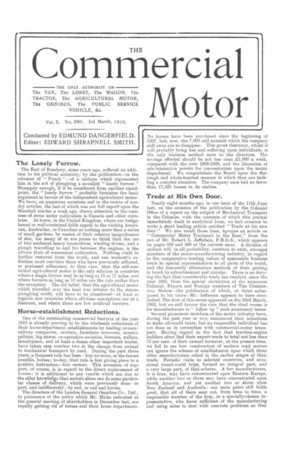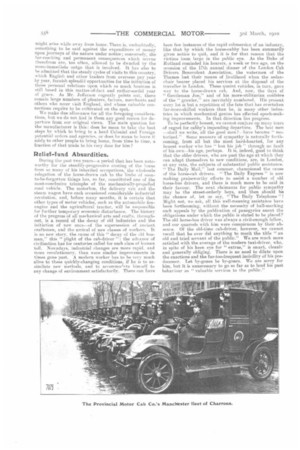The Lonely Furrow.
Page 1

Page 2

If you've noticed an error in this article please click here to report it so we can fix it.
The Earl of Rosebery, some years ago, suffered an addition to his political notoriety, by the publication—in the columns of "Punch "—of a cartoon which represented him in the act of ploughing a so-called "lonely furrow." Strangely enough, if it be considered from another standpoint, the "lonely furrow" probably furnishes the basic argument in favour of the independent agricultural motor. We have, on numerous occasions and in the course of sundry articles, the last of which was our full report upon the Marshall tractor a week ago, drawn attention to the vastness of areas under cultivation in Canada and other countries. At home, in the United Kingdom, where our hedgebound or wall-contained fields appeal to the visiting American, Australian, or Canadian as nothing more than a. series of small gardens, by reason of their relative insignificance of size, too many of us are prone to think that the use of two anchored heavy locomotives, winding drums, and a plough travelling to and fro between the engines, is the ultimo Mule of economical cultivation. Nothing could be farther removed from the truth, and one moment's reflection must convince those who have previously adhered, or professed adherence, to that view, that the self-contained agricultural motor is the only solution in countries where a single furrow may be as long as 15 or 17 miles, and where furrows as long as 10 miles are the rule rather than the exception. The old belief, that the agricultural motor which travelled over the land was inferior to the steamploughing outfit, will have to be abandoned—at least as regards new countries where old-time conceptions are at a discount, and where there are few artificial barriers.
Horse-establishment Reductions.
One of the outstanding commercial features of the year 1910 is already proving to be the wholesale reductions of their horse-department establishments by leading owners: railway companies, carriers, furniture removers, municipalities, big stores, co-operative societies, brewers, millers, laundrymen, and at least a dozen other important trades, have taken step number two in the change from animal to mechanical transport by road. During the past three years, a frequent ride has been—buy no more, or the fewest possible, horses; to-day, that rule is fast giving place to a pcsitive instruction—buy motors. This accession of support, of course, is in regard to the direct replacement of horses; it is additional to any results which are due to the older knowledge that motors alone can do some particular classes of delivery, which were previously done—in part, and indifferently—by rail, or rail and horses. The clirectora of the London General Omnibus Co., TM., in pursuance of the policy which Mr. Hicks indicated at the general meeting of shareholders in December last, are rapidly getting rid of horses and their horse department.
INo horses have been purchased since the beginning of 1907, but, now, the 7,000 odd animals which the company still owns are to disappear. This great clearance, whilst it will probably bring loss and suffering upon individuals, is the only business method open to the directors. The SSA in gs effected should be not less than 21,000 a week, compared with the year 1908-1909, and the liberation of administrative powers for concentration upon the motor department. We congratulate the Board upon the thorough and whole-hearted manner in which they are tackling a complex situation. The company once had no fewer than 17,500 horses in its stables.
Trade at His Own Door.
Nearly eight months ago, in our issue of the 17th June last, on the occasion of the publication by the Colonial Office of a report on the subject of Mechanical Transport in the Colonies, with the contents of which this journal immediately dealt in analytical form, we had occasion to write a short leading article entitled "Trade at his own door." We now recall those lines, apropos an article on "Commercial Motor Transport in the East," from the pen of Mr. Robert L. Jefferson, F.R.G.S., which appears on pages 559 and 560 of the current issue. A division of opinion will, in all probability, continue to exist, amongst members of the motor-mauufacturing industry, in regard to the comparative trading values of systematic business tours by special representatives to :di parts of the world, and the less-costly alternative methods of their getting in touch by advertisement and circular. There is no denying the fact that considerable trade has resulted, since the year 1905, from the special circulation of the numerous Colonial, Export and Foreign numbers of 'T'srs COMMER(IA!. MOTOR—tile publication of which, at dates subsequent to his tours—Mr. Jefferson appears to have overlooked. The first of this series appeared on the 23rd March, 1905, but we still favour the view that the ideal course is for manufacturers to" follow up" such missionary issues.
Several prominent members of the motor industry have, during the past year or two, announced their intentions to make all-world tours, but no responsible individual has yet done fra in connection with commercial-motor trans. port. Having regard to the fact that traction-engine builders often find their export trade to total not less than 75 per cent. of their annual turnover, at the present time, we fail to see how constructors of modern road motors can ignore the scheme of establishment upon which those older manufacturers relied in the earlier stages of their trade. Periodic visits to selected countries, and occasional round-world trips, formed an integral part, and a very large part, of that scheme. A few manufacturers, it is true, may have concentrated upon Eastern Europe, while another two or three may have concentrated upon South America, and yet another two or three upon New Zealand and Australia : our main point still holds good, that att of them sent out, from time to time, a responsible member of the firm, or a specially-chosen representative, who knew sufficient of the manufacturing and using sides to deal with concrete problems as they
might arise while away from home. There is undoubtedly, something to be said against the expenditure of money upon journeys of the nature under notice; conversely, the far-reutehing and permanent consequences w hich accrue therefrom are, too often, allowed to be dwarfed by the more-immediate outgo that is involved. It has also to he admitted that the steady cycles of visits to this country, which English and -other traders from overseas pay year by year, furnish splendid opportunities for the initiation of those personal relations upon which so much lousiness is still based in this matter-of-fact and rather-sordid year of grace. As Mr. Jefferson cogently points out, there remain large numbers of planters, factors. merrhants and others who -never visit England, find whose valuable connections require to be cultivated on the spot.
We make due allowance for all the foregoing considerations, but we do not find in them ally good reason fur departure from our original views. The main question for the manufacturer is this: does he mean to. take the best steps by which to bring to a head Colonial and Foreign potential orders and agencies, or does he mean to leave it solely to other people to bring home, from time to time, a fraction of that trade to his very door for him ?
Relief-I und Absurdities.
During the past two years—a period that has been noteworthy for the steadily-progressive misting of the horse from so many of his inherited oevnpations, the wholesale relegation of the horse-drawn cab to the limbo of soon-to-be-forgotten things has, AR far, constituted one of the mast-conclusive triumphs of the mechanically-propelled road vehicle. The motorbus, the delivery van and the steam wagon bate each occasioned considerable industrial revolution, and, before many months, it is certain that other types of motor vehicles, such as the automobile fireengine and the agricultural tractor, will be responsible for further temporary economic disturbance. The history of the progress of all mechaniral arts and crafts. throughout, is a, record of the decay of old industries and the initiation of new ones—of the supersession of ancient craftsmen, and the arrival of new classes of workers. It is no new story, the cause of this " decay of the old busman," this " plight of the cab-driver " : the advance of civilization has for centuries called for such class of human toll. Nowadays, industrial changes are more rapid, and more revolutionary, than were similar improvements in times gime past. A modern worker has to be very much alive to these quickly-changing conditions, if he is to assimilate new methods, and to necommcrlate himself to any change of environment satisfactorily. There ran have been few instances of the rapid submersion of an industry, like that by which the horse-cabby has been summarily given notice to quit, and it is for that reason that the victims loom large in the public eye. As the Duke of Rutland reminded his hearers, a week or two ago, on the occasion of the 17th annual dinner of the London Cab Drivers Benevolent Association, the watermen of the Thames lost their means of livelihood when the sedanchair bearer placed his services at the disposal of the traveller in London. These quaint vehicles, in turn, gave way to the horse-drawn cab. And, now, the days of " Gentleman Joe," and of his more-utilitarian confrere of the " growler," are inevitably numbered. Ills present sorry lot is but a repetition of the fate that hasovertaken far-more-skilled workers than he, in many other industries in which mechanical genius has effected epoch-making improvements. In that direction lies progress.
To be perfectly honest, we cannot conjure up many tears of regret for cabby's impending departure. The best men —shall we write, all the good men 9—have become " motorized." Some measure of sympathy is naturally forthcoming, from all but the most hard-hearted, for any honest worker who has " lost his job " through no fault of his own—his age, perhaps. It is, indeed, good to think that the older drivers, who are past the age at which they can adapt themselves to new conditions, are, in London, at any rate, the subjects of substantial public assistance. " The Daily Mail," last summer, championed the cause of the horse-cab drivers. " The Daily Express " is now making praiseworthy efforts to assist a number of old horse-bus drivers, and there is much more to be said in their favour. The next claimants for public sympathy may be the street-orderly boys, and then should be the chance of, let US say, " The Daily Telephone "I Might not, we ask, all this well-meaning assistance have been forthcoming, without the necessity of hall-marking snch appeals by the publication of panegyrics anent the obligations under which the public is stated to be placed? The old horse-bus driver was always a civil-enough fellow, and our quarrels with him were conspicuous by their absence. Of the old-time cab-driver, however, we cannot recall that he ever did anything to merit the title " an old and tried servant of the public." We are much more satisfied with the average of the modern taxi-driver, who, in spite of his keen eye for " extras," is smart, cleanly and generally obliging. There is no need to dilate upon the exactions and the far-too-frequent incivility of his predecessor. Let by-genes be by-gones. We are sorry for him, but it is unnecessary to go so far as to land his past behaviour as " valuable services to the public."






















